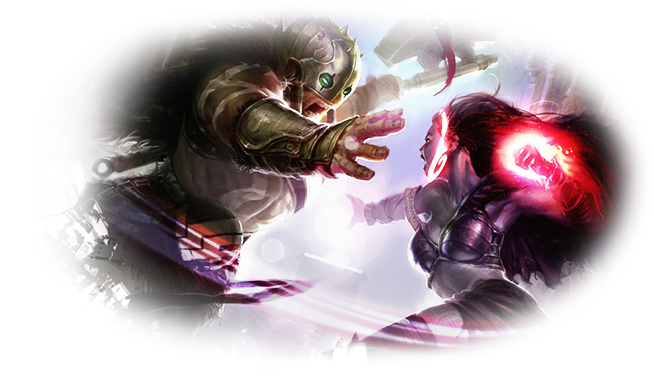
Welcome to Magic Duels. You are a Planeswalker, a powerful mage dueling across the myriad worlds of the Multiverse.
Summon fearsome creatures, control ancient artifacts, and cast powerful spells as you battle other Planeswalkers. Build your collection of Magic cards, unlocking unlimited deck possibilities.
Online Support
If you’ve got a question, chances are good that you can find the answer in our online Knowledge Base (http://wizards.custhelp.com).
Still need assistance? Our friendly support team can help! To create a support request, go to http://www.wizards.com/customerservice. You will be asked to sign in with your Wizards Account.
If you don't have a Wizards Account, you can find instructions for creating one here. Once you create your account, log in, and submit a request to our team. You will typically hear from us within 24 hours.
Phone Support
Seven Days a Week (Mon-Sun)
7am-7pm (Pacific Time)
US/Canada: (800) 324-6496
Other Countries: (425) 204-8069
Africa & European Union Game Support
In order to best serve our customers, Game Support for Africa and the European Union is done by language. Representatives standing by to provide support and assistance in the following languages:
English
Email: wizards@hasbro.co.uk
Italian
Email: wpn@hasbro.it
Spanish
Email: wpn@hasbro.es
German
Email: wpn@hasbro.de
French
Email: wpn@hasbro.fr
Dutch
Email: wpn@hasbro.nl
Czech
Email: wpn_cz@hasbro.co.uk
Polish
Email: wpn_pl@hasbro.co.uk
Russian Federation Game Support
Russian Federation Game Support provides assistance in Russian and English.
Email:wpn_ru@hasbro.co.uk
Asia Pacific Game Support
Asia Pacific Game Support provides assistance in English, Chinese, and Korean.
Email: apac@wizards.com
Japanese Game Support
Japanese Game Support provides assistance in Japanese and English.
Phone: +81 03 3258 6050
Email:wpnjapan@wizards.com
To access Community Meld, press on this game's Main Menu or Pause Menu. From there, use your controller to navigate.
To cast a spell, you need mana, the magical energy produced by your lands. Each of your lands produces one mana when it taps, or turns sideways. Tapping shows a card’s been used for the turn. To see a spell’s mana cost, look in the top right corner of the card.
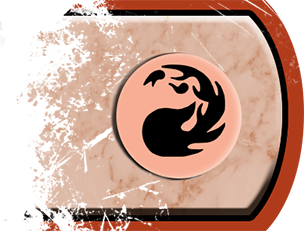
Power and Toughness
Each creature card has a special box in the lower right with its power and toughness.
 A creature’s power (the first number) is how much damage it deals in combat.
A creature’s power (the first number) is how much damage it deals in combat.
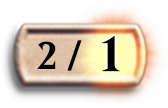 Its toughness (the second number) is how much damage must be dealt to it in a single turn to destroy it.
Its toughness (the second number) is how much damage must be dealt to it in a single turn to destroy it.Mana is the main resource in the game. It’s produced by lands, and you spend it to cast spells.
 The symbols in a card’s upper right corner tell you the cost to cast that spell.
The symbols in a card’s upper right corner tell you the cost to cast that spell.
Mana is the main resource in the game. It’s produced by lands, and you spend it to cast spells.
 The symbols in a card’s upper right corner tell you the cost to cast that spell.
The symbols in a card’s upper right corner tell you the cost to cast that spell.Power and Toughness
Each creature card has a special box in the lower right with its power and toughness.
 A creature’s power (the first number) is how much damage it deals in combat.
A creature’s power (the first number) is how much damage it deals in combat.
 Its toughness (the second number) is how much damage must be dealt to it in a single turn to destroy it.
Its toughness (the second number) is how much damage must be dealt to it in a single turn to destroy it.
 White magic lays down the law, protecting and defending its allies. White mages call on soldiers, knights, and even angels. For them, honor and light are shield and sword.
White magic lays down the law, protecting and defending its allies. White mages call on soldiers, knights, and even angels. For them, honor and light are shield and sword. Blue magic is about air, water, and things of the mind. Blue mages use their vast knowledge and quick reactions to control the battlefield and gain the upper hand.
Blue magic is about air, water, and things of the mind. Blue mages use their vast knowledge and quick reactions to control the battlefield and gain the upper hand. Black magic enslaves and corrupts. Black mages wield spells of death and darkness to satisfy their desire for power. They will do whatever it takes to win.
Black magic enslaves and corrupts. Black mages wield spells of death and darkness to satisfy their desire for power. They will do whatever it takes to win. Red magic embodies fire and lightning, passion and fury. Mages who wield it are quick to act and quick to anger, smashing and burning their way to victory.
Red magic embodies fire and lightning, passion and fury. Mages who wield it are quick to act and quick to anger, smashing and burning their way to victory. Green magic is all about tooth-and-claw ferocity. Green mages revere life, growth, and the brute force of nature. They summon huge creatures to do their bidding.
Green magic is all about tooth-and-claw ferocity. Green mages revere life, growth, and the brute force of nature. They summon huge creatures to do their bidding.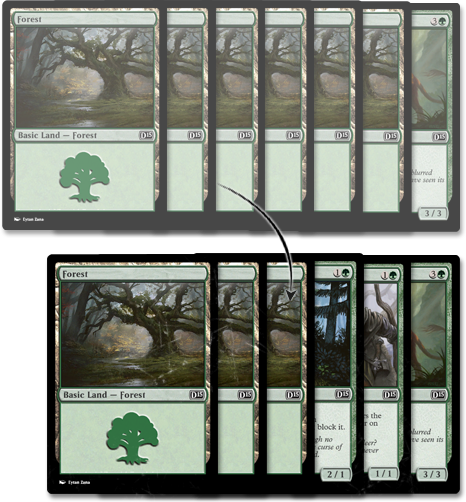
At the beginning of each game, you draw a hand of seven cards. If you don’t like your opening hand, you may take a mulligan, shuffling your hand back into your library and drawing another seven cards.
If you take a second mulligan, you’ll draw one fewer card, so your hand will have six cards. Each subsequent mulligan will decrease your hand by one card.
In most cases, you should take a mulligan if you have fewer than two lands or more than five lands in your opening hand. You may also want to take a mulligan if your opening hand has cards of one color and lands that produce another color of mana (all green cards and Islands, for example).
Land cards are the foundation of every Magic deck. Lands provide mana, the magical energy you need to cast all the other cards in your deck. You can play one land from your hand onto the battlefield on each of your turns. Lands stay on the battlefield in front of you.
There are five types of basic lands, one associated with each color of mana. Plains can be tapped for white mana, Islands for blue mana, Swamps for black mana, Mountains for red mana, and Forests for green mana.
Creature
You summon creatures to the battlefield to attack your opponents and defend you from their attacks. There are Knights, Beasts, Dragons, and dozens of other types of creatures. These creature types appear after the dash. You cast creature spells during your turn.
Sorcery
A sorcery is a powerful incantation that can have a wide range of effects. After a sorcery is cast, its effect happens and then the sorcery is put into its owner’s graveyard. You cast sorceries during your turn.
Instant
Like a sorcery, an instant has an effect on the game and then is put into its owner’s graveyard. But you can cast an instant during either player’s turn, at almost any time . . . even in response to another spell!
Enchantment
Enchantments are permanents—stable magical manifestations that stay on the battlefield after you cast them. While an enchantment is on the battlefield, it has an effect on the game. You cast enchantment spells during your turn.
Enchantment — Aura
Auras are a special type of enchantment. Most attach to a single creature and affect only that creature. Each has an “enchant” ability that tells you what that Aura attaches to.
You can target any creature with most Auras. Read each one to see how it affects the enchanted creature. If it has a negative effect, you can choose to attach it to one of your opponent’s creatures. If the enchanted creature leaves the battlefield, the Aura is put into your graveyard.
Artifact
Artifacts are permanents—magical items that stay on the battlefield after you cast them. While an artifact is on the battlefield, it has an effect on the game. Most artifacts are colorless, meaning they work well in any deck. You cast artifact spells during your turn.
Artifact — Equipment
Equipment represent weapons, armor, and other gear you can give to your creatures to make them more powerful. Each Equipment has an equip cost that you can pay during your main phase to attach the Equipment to one of your creatures. If an equipped creature leaves the battlefield, the Equipment remains on the battlefield and can be attached to another creature.
Planeswalker
Planeswalker cards represent incredible allies that you can call to your side during a battle. A planeswalker has loyalty, indicated by the number in the lower right corner. You can activate one of a planeswalker’s abilities on each of your turns. Doing so will add or subtract loyalty from that planeswalker.
Your creatures can attack opposing planeswalkers instead of attacking your opponent. Damage dealt to a planeswalker causes it to lose that much loyalty. A planeswalker with 0 loyalty goes to its owner’s graveyard.
Play Card
Cancel Action
Stop Timer
Continue
Zoom Selected Card
Toggle Mana Tapping
Change Selection
Free Selection
Pause Game
Xbox Home Menu
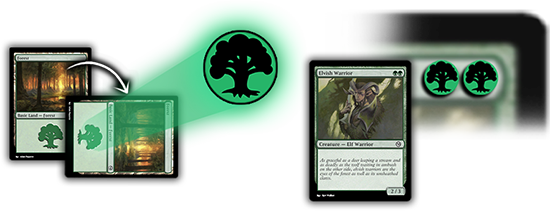
Each spell has a mana cost in its upper right corner. (Land cards are never cast as spells.) To cast a spell, you must pay this cost by tapping your lands (turning them sideways) to produce mana. Tapping shows the lands have been used for the turn. Tapped lands untap (straighten out) at the start of your turn so they can be used again.
In Magic Duels, spells you have enough mana to cast will glow. When you cast a spell, your lands will automatically become tapped to pay for that spell’s mana cost.
After a few seconds of inactivity, an arrow pointing at the best card to play will appear.
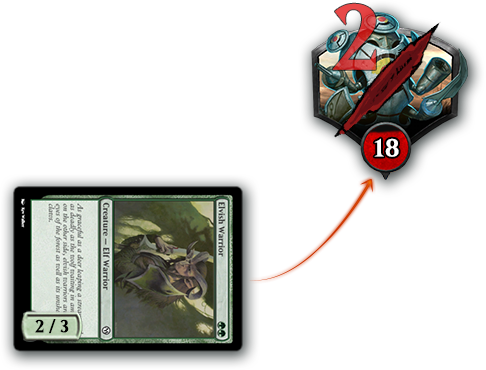
Attack
Your creatures attack the opponent, not the opponent’s creatures. You don’t choose which creatures, if any, block your attacking creatures.
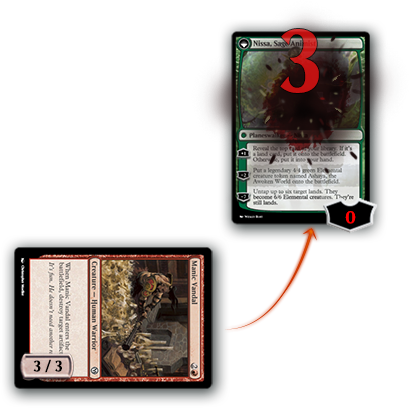
Attacking a Planeswalker
If your opponent controls a planeswalker, each of your attacking creatures can attack that planeswalker instead of attacking your opponent. Your opponent can block a creature attacking a planeswalker as normal.
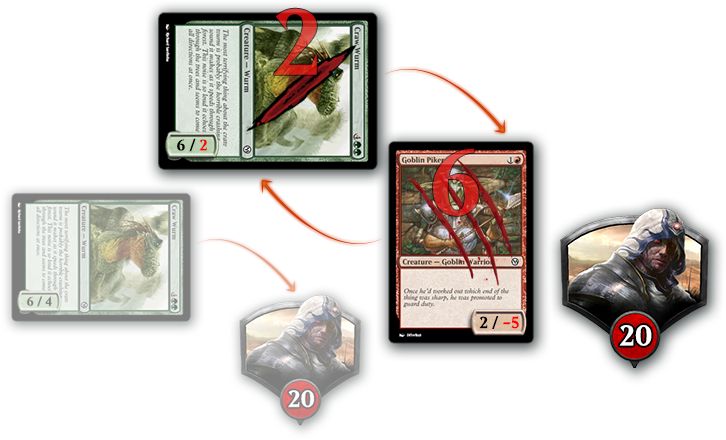
Block
Untapped creatures can block attacking creatures. To do this, select a creature you want to block with, and then select which attacking creature you want it to block. Tapped creatures can’t block, but creatures with summoning sickness can.
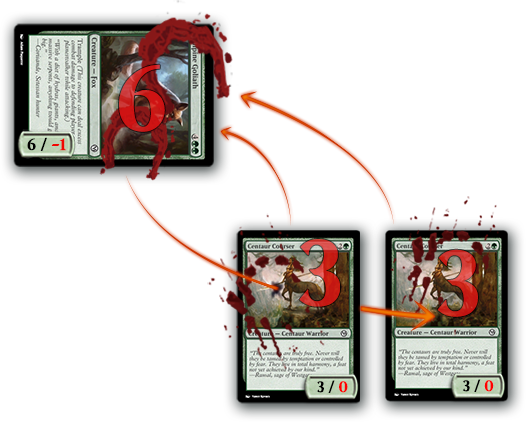
Blocking with Multiple Creatures
You can block a single attacking creature with multiple creatures. This lets small creatures “gang up” to take down a larger one.
After you’ve chosen one creature to block with, repeat the process for each additional creature you wish to block with.
The attacker will choose one of the blocking creatures and deal enough damage to destroy it. The rest of its damage will be dealt to the next blocker, and so on.
Deck Wizard
If you’re new to Magic deckbuilding, start with the Deck Wizard. You’ll first choose a deck archetype, a specific style of deck from a list of options. Once your deck archetype is chosen, you’ll start choosing cards that support that archetype’s strategy. The Deck Wizard will guide you every step of the way, including choosing how many lands your deck should have.
Once you’ve chosen the right cards, you can personalize the deck by choosing an avatar and background for your deck box, as well as naming the deck.
Deck Builder
The Deck Builder gives you complete control over the deck you build. Browse your entire collection to put together whatever kind of deck you want to play. Blue control spells backed up by white flying creatures? All green creatures with trample? The choices are endless. Use the filters at the top of the screen to quickly find the right cards.

Mana curve
Magic Duels quickly breaks down your deck so you can see if you have the mix of cards you want. If you’re new to deckbuilding, here are some tips to get you started:
Mana curve
Many successful decks include cards with low and high mana costs. If your deck is filled with inexpensive cards, you’ll likely get a good start, but your late-game plays won’t be strong enough to finish things. If your deck has just mana-hungry cards aimed for the late game, you might get overwhelmed by a speedy opponent. Aim for a mix!
Keep Your Deck Small
Decks have a minimum size of 60 cards. You can play with any number of basic lands and up to 4 of any other card. Most successful deck creators stay at 60 cards so they draw their best cards more often.
Creatures and Lands
Most Magic decks work best when they include about 24 land cards (about 40% of the deck) and 15 to 24 creature cards (about 25–40% of the deck). Some decks work with other amounts, but start here and experiment to see what works for you.
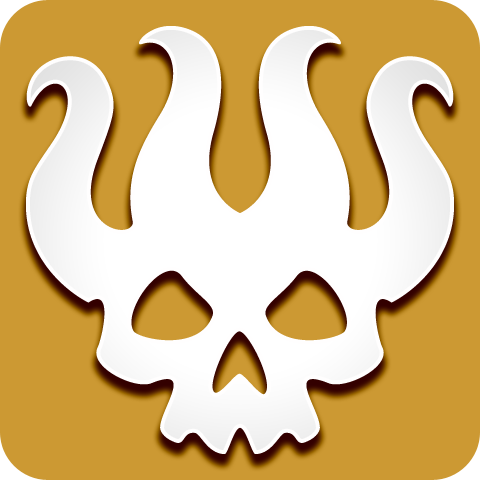 Deathtouch
Deathtouch
Creatures dealt damage by something with deathtouch are destroyed.
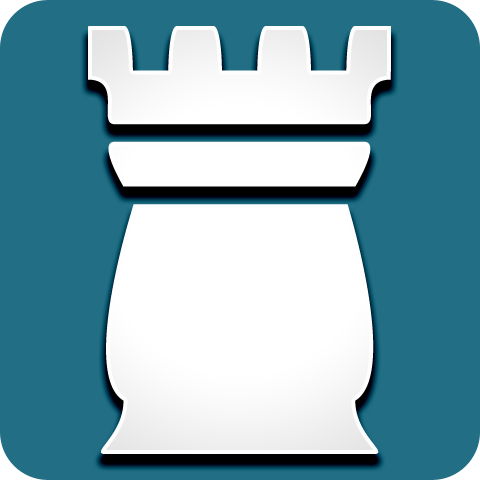 Defender
Defender
Creatures with defender can’t attack.
 Double Strike
Double Strike
A creature that has double strike deals damage twice in combat: once when creatures deal first-strike damage and again when creatures deal regular damage. It’s possible for damage dealt by a creature with double strike to destroy another creature before the other creature can deal its combat damage.
 First Strike
First Strike
Creatures that have first strike deal combat damage before other creatures. It’s possible for damage dealt by a creature with first strike to destroy another creature before the other creature can deal its combat damage.
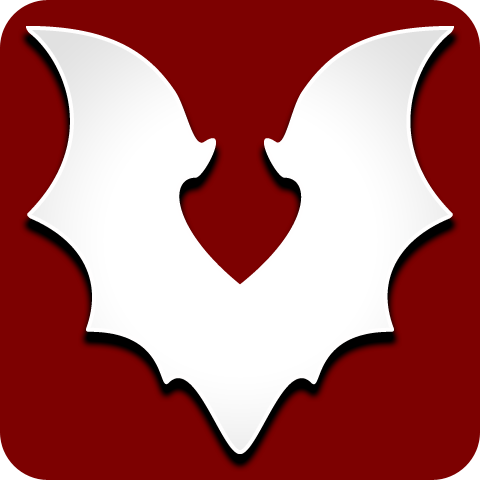 Flying
Flying
Creatures with flying can’t be blocked except by creatures with flying or reach.
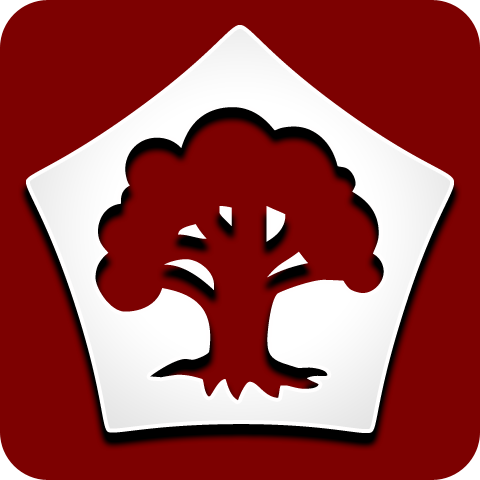 Forestwalk
Forestwalk
A creature with forestwalk can’t be blocked if the defending player controls a Forest.
 Haste
Haste
Creatures with haste ignore summoning sickness. They can attack and their  abilities can be activated no matter when they entered the battlefield.
abilities can be activated no matter when they entered the battlefield.
 Hexproof
Hexproof
A creature with hexproof can’t be chosen as the target of a spell or ability controlled by an opponent, including Aura spells. If a spell or ability doesn’t use the word “target,” it may still affect a creature with hexproof.
 Indestructible
Indestructible
An indestructible permanent can’t be destroyed.
If an indestructible creature has been dealt enough damage to destroy it, the creature is not destroyed. If an indestructible creature’s toughness is 0 or less, it’s still put into its owner’s graveyard.
Indestructible permanents can still be sacrificed, returned to their owners’ hands, exiled, or put into their owners’ libraries.
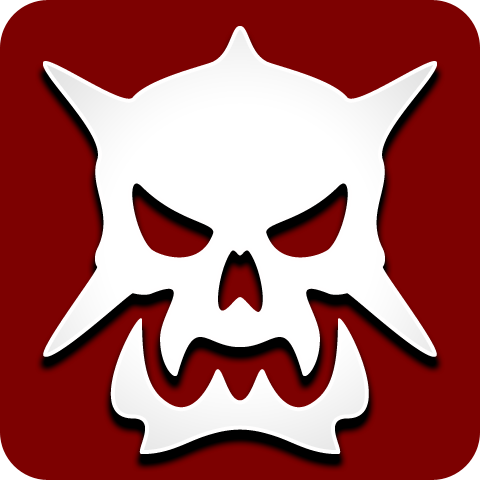 Intimidate
IntimidateCreatures with intimidate can be blocked only by creatures that share a color with them and/or artifact creatures.
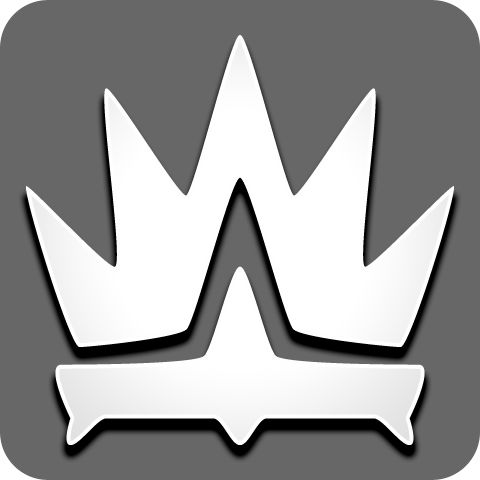 Legendary
LegendaryIf a player controls more than one legendary permanent with the same name, that player chooses all but one of them to put into their owners’ graveyards.
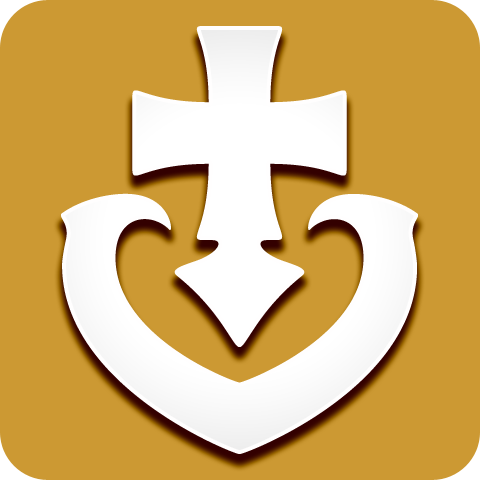 Lifelink
LifelinkDamage dealt by a creature with lifelink also causes its controller to gain that much life.
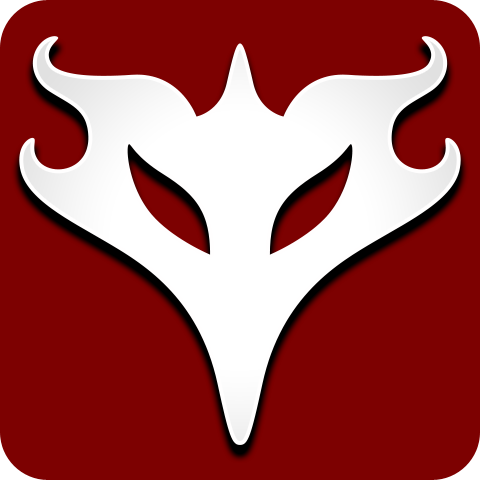 Menace
MenaceA creature with menace can’t be blocked except by two or more creatures.
 Protection
ProtectionA creature with protection will always have “protection from ________.” That something is what the creature is protected from. It might be protection from red, for example, or protection from Goblins. Protection does several specific things for the creature:
- All damage those kinds of sources would deal to the creature is prevented.
- The creature can’t be enchanted by those kinds of Auras or equipped by those kinds of Equipment.
- The creature can’t be blocked by those kinds of creatures.
- The creature can’t be targeted by those kinds of spells or by abilities from those kinds of cards.
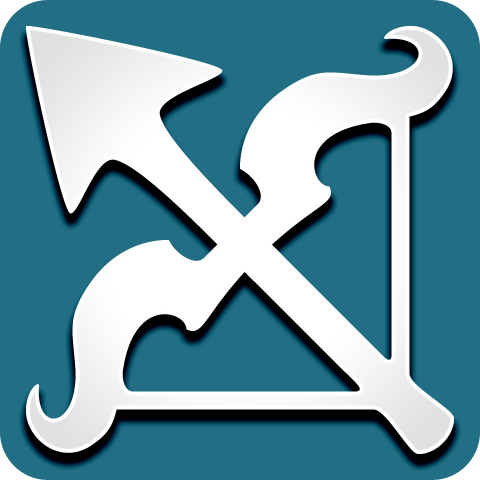 Reach
ReachA creature with reach can block creatures with flying, even though it doesn’t have flying itself.
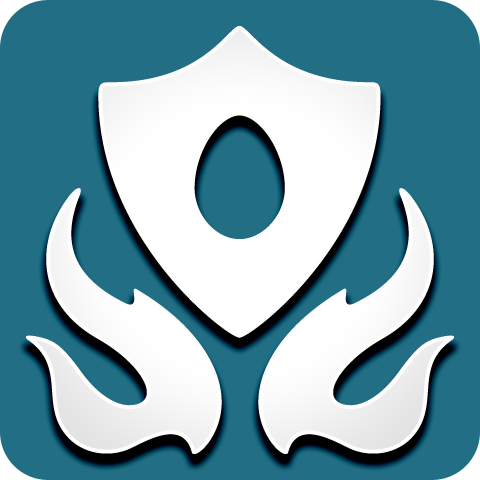 Regeneration
RegenerationRegeneration creates a “shield” that prevents the creature from being destroyed one time. Make sure to regenerate a creature and set up the shield before it’s actually destroyed.
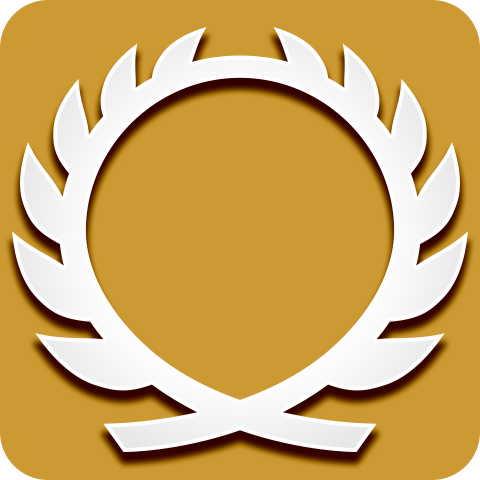 Renown
RenownA creature with renown gets a number of +1/+1 counters the first time it deals combat damage to an opponent. When this happens, the creature becomes “renowned.” Other cards may refer to a renowned creature.
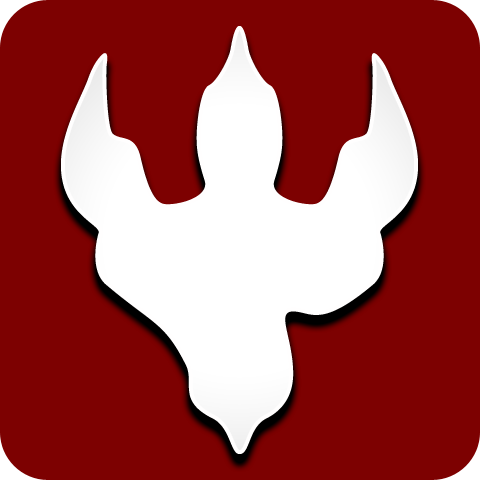 Trample
TrampleIf a creature with trample would deal enough combat damage to its blockers to destroy them, it can assign the rest of its damage to the defending player.
 Undying
UndyingWhen a creature with undying dies while it doesn’t have a +1/+1 counter on it, it’s returned to the battlefield with a +1/+1 counter on it.
 Vigilance
VigilanceCreatures with vigilance don’t become tapped when they attack.